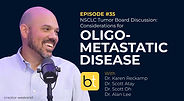BackTable / Tumor Board / Podcast / Episode #6
Transplantation for HCC: Who, When & How?
with Dr. Heather Patton, Dr. John Seal and Dr. Steven Young
The process of liver transplantation involves many complexities, and each patient's path to transplant is unique. To offer insider perspectives on this process, Dr. Zachary Berman sits down with transplant and hepatobiliary surgeon Dr. John Seal, as well as transplant hepatologists Dr. Heather Patton and Dr. Steve Young.
This podcast is supported by an educational grant from AstraZeneca Pharmaceuticals and Boston Scientific.

BackTable, LLC (Producer). (2025, January 17). Ep. 6 – Transplantation for HCC: Who, When & How? [Audio podcast]. Retrieved from https://www.backtable.com
Stay Up To Date
Follow:
Subscribe:
Sign Up:
Podcast Contributors
Synopsis
The panel begins by discussing the multidisciplinary pre-transplant evaluation process, which assesses factors such as liver function, comorbidities, surgical risk, and the availability of psychosocial support. Once a patient is listed for transplant, they enter a system that prioritizes those with the highest Model for End-Stage Liver Disease (MELD) score. During the waiting period, several comorbidities should be carefully monitored. Dr. Seal explores the impact of portal vein hypertension and portal vein thrombosis, explaining how these conditions may necessitate intraoperative thrombectomy or bypass. Dr. Patton and Dr. Young focus on considerations for using anticoagulation in patients with a high baseline bleeding risk and selecting the appropriate anticoagulant for patients listed for transplant.
For patients with hepatocellular carcinoma (HCC), eligibility for MELD exception points may depend on factors such as time spent on the waiting list, adherence to the Milan criteria, and the presence of extrahepatic complications of liver disease. The panel also discusses bridging therapies to transplant, including Y90 and TACE. In the peri-transplant phase, they highlight innovations such as living donor transplants, liver perfusion pumps, and the use of hepatitis C- and HIV-positive organs. Finally, the discussion turns to post-transplant considerations, including surgical complications, organ rejection, immunosuppression, predictors of HCC recurrence, and long-term surveillance.
Timestamps
00:00 - Introduction
01:16 - Current Landscape of Liver Transplantation
03:22 - Transplant Evaluation Process
09:48 - Timeline from Listing to Transplantion
11:16 - Treating Portal Vein Thrombosis and Hypertension
18:44 - MELD Exception Points
22:05 - Bridging Therapies
25:34 - Peri-Transplant Considerations
30:53 - Post-Transplant Period
37:39 - Repeat Transplantation
Resources
Model for end-stage liver disease (MELD) and allocation of donor livers (Wiesner et al, 2003):
https://www.gastrojournal.org/article/S0016-5085%2803%2950022-1/fulltext
Liver transplantation for the treatment of small hepatocellular carcinomas in patients with cirrhosis- Milan Criteria (Mazzaferro et al, 1996):
https://pubmed.ncbi.nlm.nih.gov/8594428/
Validation of the prognostic power of the RETREAT score for hepatocellular carcinoma recurrence using the UNOS database (Mehta et al, 2019):
https://pmc.ncbi.nlm.nih.gov/articles/PMC6445634/
CME Accreditation Information:
https://f7cae4ec-b69e-490d-9e0f-19b16a6f146d.usrfiles.com/ugd/f7cae4_a7c37ea3cd1b4d3fa53d5edf8dfe255b.pdf
Transcript Preview
[Dr. John Seal]
We keep trying Amazon, and they're all out of livers, so it's not working. I even got Prime. Yes, that becomes complicated. Once they're on the list, then it depends on how sick they are, is one answer to that. Patients who come in with really decompensated liver disease and a very high MELD score can get transplanted the day after they get listed. It's never happened, but they can usually get transplanted pretty quickly.’
The trick is that we have a system that prioritizes the MELD score for highest MELD score. If you have a high MELD score, then you can get transplanted pretty quickly, but even if it's the mean for that area or below, then the waiting time is highly variable and often quite long. The reality for the patient is they just got approved, they know they need this therapy, and there's extraordinary anxiety because we can't just tell them when that's going to happen. The waiting time can vary quite a lot. I think if we think about this in terms of transplant for cancer, then there's a system by which even patients with low MELD scores will get more. We may tackle that in a little more detail. That's going to dictate also when they get transplanted.
[Dr. Zach Berman]
So it's based on MELD score?
[Dr. John Seal]
MELD score. Go home, pack a bag. We'll call you when we got one
The Materials available on BackTable are for informational and educational purposes only and are not a substitute for the professional judgment of a healthcare professional in diagnosing and treating patients. The opinions expressed by participants of the BackTable Podcast belong solely to the participants, and do not necessarily reflect the views of BackTable.



















